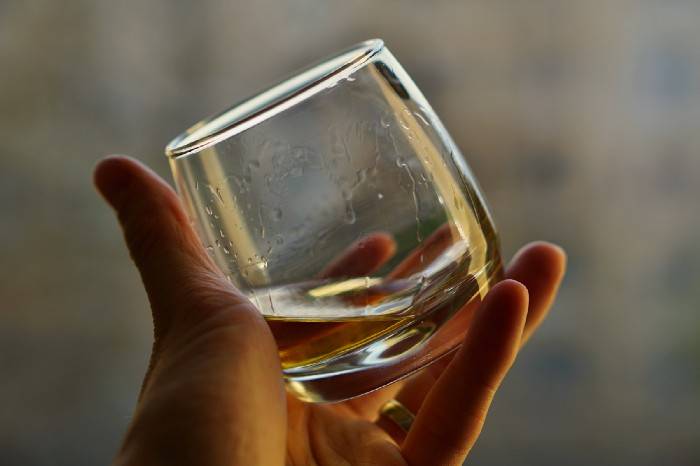“Pour out a little liquor” and other thoughts on libation as a cultural practice.
afrobella
afrobella
A hand offers up a small glass of whiskey. From coffee to alcohol, offering a drink to the dead is a cultural practice many of us embrace.
ByOctober 31st you’ll see any number of online posts about spooky cocktails, skull-shaped ice cubes, festive punchbowl presentations involving dry ice — the usual Halloween cocktail fare. This year, let’s go a little deeper. We’re in the season of All Hallow’s Eve, All Saints Day, and the Day of the Dead, a time when we visit cemeteries to remember our loved ones and celebrate their lives. This is a time to consider alcohol as more than just a beverage — consider what it means as a spirit and to the spirits.
The first time I witnessed the ritual of someone pouring out spirits for those we miss, it was my mother. From the moment a bottle of alcohol was cracked open in our household, or she had a freshly-made drink in her hand, she’d dash out a little to the ground, and explain — “that’s for the spirits.” This practice of pouring some out for our ancestors has deep roots in a collective history from across the Diaspora. It’s known as libation or a libation ceremony in many cultures, upheld as a tradition and religious offering from the time of ancient Egypt, Greece, and Israel. The practice of offering spirits to the saints or spirits is upheld in the Caribbean, the Americas, Africa, and Asian cultures. Around the world, people pour some out for their loved ones in formal and informal rituals on graves or at wedding ceremonies, or drinks are offered as a symbol, sacrifice or tribute on an altar or ofrenda.
When it comes to pouring out some for those we’ve lost, in my seen experience it’s pretty much been whatever came to hand, whatever the person offering the tribute may have been sipping on at the time. But what do the spirits prefer? Is there a particular libation that should traditionally be offered? That may depend on the spirit, on where or how they lived.
“The tradition in Trinidad is that when you open a new bottle of any kind of spirituous liquor, you give the first drink to those who are not here to physically have a drink themselves. It starts with just throwing some liquid from the bottle out onto the floor or into the air. This comes out of West African and Central African ancestral veneration traditions,” explains Trinidadian writer and cultural worker Attillah Springer, who offered greater understanding from her own spiritual practice. “Within Ifa/Orisha, if you have an ancestral table, you often offer both food and drinks to ancestors who are in active veneration. So if you go into the house of someone who has very revered ancestors, like a grandmother or grandfather it is common to see, particularly on a Monday — that is the day for ancestral veneration — you would put out things that that the ancestor would have liked to partake in. So, for some of us who have ancestors who would have worked in coffee, cocoa, and sugar cane, we offer the things that our antecedents would have been involved in making. And so you offer a little bit of rum, you offer a little bit of coffee, and also you offer water, because water is just a symbol of life and the regenerative property of this substance that is such an important part of our lives.”
Even without creating a literal at-home shrine or altar to remember our ancestors on a weekly basis, the practice of pouring out liquor is a familiar one to any student of Black music. From Tupac’s Pour Out a Little Liquor to Boyz II Men’s It’s So Hard to Say Goodbye to Yesterday, there are celebrated musical moments of keeping the time-honored ritual in practice. Today, many of us continue to pour out a little for those lost whenever we gather, in a moment of remembrance.
“That tradition of honoring ancestors is built into every drink that we have, but as time has passed we’ve moved from offering a daily drink — if you don’t have a shrine for your ancestors — now, when we gather together and we’re about to have a drink, usually it’s from a brand new bottle — you offer that first drink for those who you might have had shared a drink with in previous years. Now this person has passed onto another realm, but you acknowledge the energy of this person still in your life, still in your memories, through offering them a drink of what you shared before,” explains Springer.
I personally love the history and significance of libation. This is a practice so deeply cultural for me and my family, and also my parents have very specific drinks of choice. I know when they are no longer with me, the scent of Campari will always bring my mother’s memory to life. My father’s cocktail of choice is a Caribbean classic — scotch and coconut water. I know exactly what to order at the bar if I ever want to raise a toast to my parents. So this Halloween season, join in an ancient tradition. Raise a toast to your guardian angels and think twice about what you’re mixing before you fix that drink.
SOURCE : Medium




